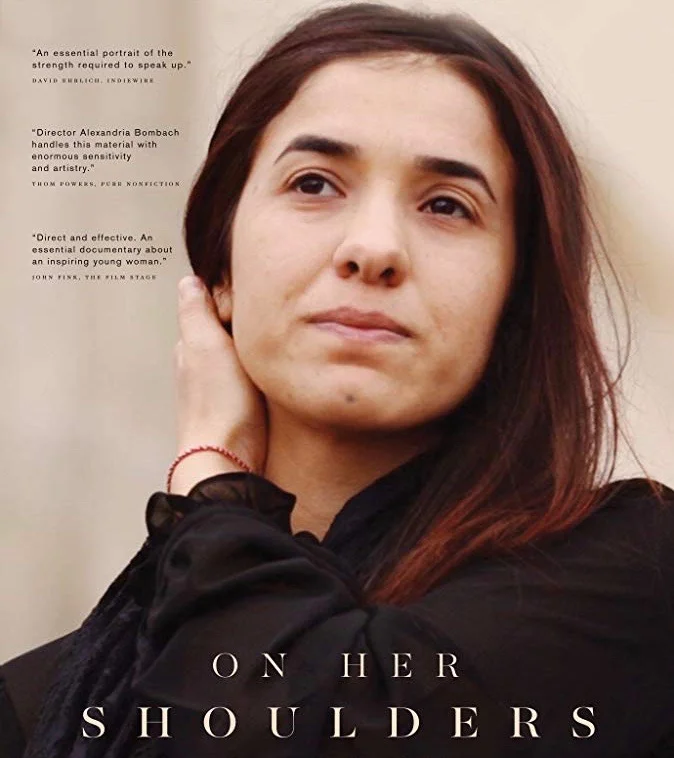BY: PHEDRA NEEL, RESEARCH ASSOCIATE, PILPG-NL
DURING THE HUMAN RIGHTS WEEKEND ORGANIZED BY HUMAN RIGHTS WATCH AND DE BALIE, THE DOCUMENTARY ‘ON HER SHOULDERS’ WAS SHOWN. THIS FILM DRAWS ATTENTION TO NOBEL PEACE PRIZE WINNER NADIA MURAD AND HER FIGHT FOR THE RECOGNITION OF THE YAZIDI GENOCIDE. THE YAZIDI ARE A RELIGIOUS MINORITY THAT WAS ATTACKED BY ISIS. THIS BLOG POST REFLECTS ON THIS FIGHT AND CONSIDERS EXPLANATIONS WHY SOME MEMBERS OF THE INTERNATIONAL COMMUNITY ARE RELUCTANT TO USE THE WORD ‘GENOCIDE’.
Between the 7th and 10th February 2019, Human Rights Watch organized, in cooperation with De Balie, the seventh edition of the Human Rights Weekend. This year’s topic was “Where do I stand” and invited the attendees to think about how they are (in)directly involved in human rights violations and how they can contribute in ending these violations. The program consisted of masterclasses, lectures, and documentaries. One of these documentaries showed the incredible story of Nadia Murad. Nadia is a Yazidi girl, who witnessed her community being murdered by ISIS. She was later captured herself and forced to become a sex slave. Today she is known as the most recent Nobel peace Prize winner for her global advocacy campaign to fight for the rights of the Yazidi. This campaign consists of addressing heads of states and governments, asking for help for the survivors and for the attack on her people to be considered as genocide. Whereas some states have indeed passed legislation that recognizes the events as genocide, others refuse to do so until the United Nations (UN) itself officially uses the word genocide to describe the atrocities.
The Yazidi are a religious minority living in small communities in the Sinjar region in Northern Iraq. According to Nadia herself, they have allegedly endured 74 genocides, the latest one being executed by ISIS. On August 3, 2014, ISIS invaded Sinjar and destroyed whole villages. They lined up the men and executed them, they killed the elderly women and forced all girls above the age of nine to become sex slaves. All boys under the age of twelve were trained to join the fighting brigades of ISIS. In Nadia Murad’s village, Kocho, only fifteen men survived the attack. Other villages suffered the same brutality or are still suffering, as around 3000 girls are still believed to be sex slaves.
In June 2016, the Independent International Commission of Inquiry on the Syrian Arab Republic, a UN inquiry mission, claimed that ISIS was committing a genocide against the Yazidi. The Chair, Paulo Pinheiro, emphasized that genocide has occurred and that it is ongoing. According to Commissioner Carla Del Ponte, “ISIS has subjected every Yazidi woman, child or man that it has captured to the most horrific of atrocities. […] ISIS has made no secret of its intent to destroy the Yazidis of Sinjar, and that is one of the elements that allowed us to conclude their actions amount to genocide”.
Even though the UN experts have stated that these events qualify as genocide, the UN as such has not used this term in a definite manner. What it has done, however, is adopt a United Nations Security Council Resolution in September 2017, which established an investigative team in order to document the atrocities and to hold the perpetrators responsible. This team, after a year of talks with Baghdad to secure its cooperation, will start its operations in 2019. However, it is yet to adopt a Resolution defining the events as a genocide.
Some states decided to act before the UN and passed national legislation to qualify the atrocities as genocide. According to the Times of Israel, the United States House of Representatives passed a motion deeming the mass killings to be a genocide in March 2016. This was followed by the Scottish Parliament and the British House of Commons in April 2016, Canada in October 2016, France in December 2016, and Armenia in 2017. Others however, refuse to do so until the UN officially declares the atrocities a genocide.
Why is it that the UN has failed to declare the atrocities as genocide, and are states seemingly waiting for the UN to act first? The word ‘genocide’ is a legal concept defined by article 2 of the 1948 Genocide Convention 1948. The following articles of the Convention create obligations for the states parties to the Convention, calling on them to adopt legislation, try the perpetrators, provide effective penalties, among other legal obligations. In other words, calling a situation a genocide also means activating legal obligations under the Genocide Convention.
Secondly, genocide is a heavily loaded term that plays a strong role in international relations. If you call a country out for genocide, it is very likely that the diplomatic ties between the two concerned states will be broken or will be, at the very least, strained. For example, several countries refuse to recognize the Armenian genocide in an attempt to keep friendly relations with Turkey.
Lastly, genocide is sometimes called the crime of all crimes. If a country admits that a genocide is taking place or has been taking place, then that country admits that it, as a member of the international community, has failed to prevent the most serious international crime from taking place and that it has failed to protect international peace and security.
Therefore, the United Nations does not use the term lightly and it is most likely awaiting the findings of the team now operating in the field, before officially labelling the atrocities as genocide. As long as the United Nations postpones this declaration, countries can hide behind the organization to not risk diplomatic repercussions. This means that the Yazidi will have to wait even longer for their suffering to be recognized as suffering constituting genocide.

